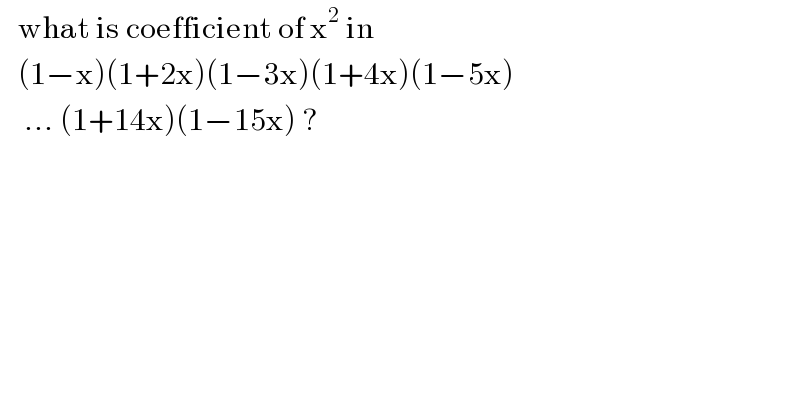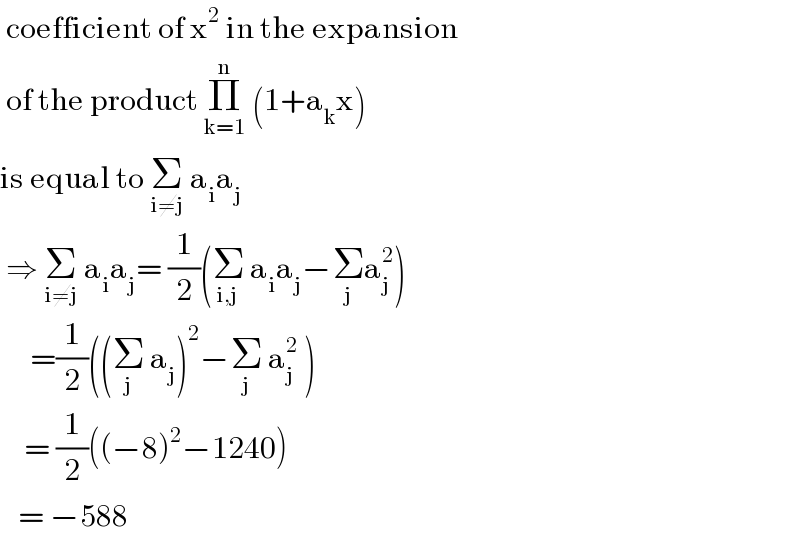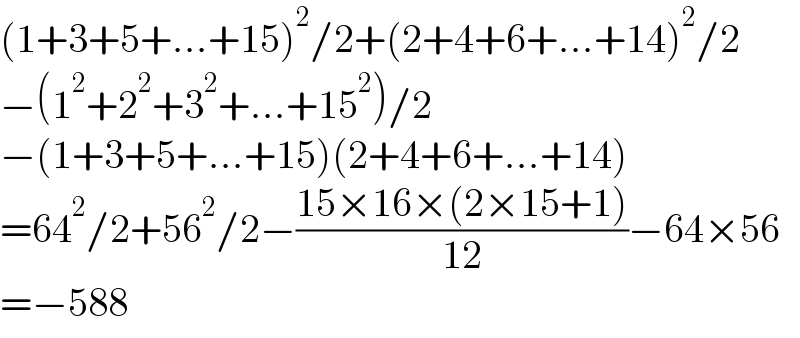Question Number 177822 by cortano1 last updated on 09/Oct/22

$$\:\:\:\mathrm{what}\:\mathrm{is}\:\mathrm{coefficient}\:\mathrm{of}\:\mathrm{x}^{\mathrm{2}} \:\mathrm{in}\: \\ $$$$\:\:\:\left(\mathrm{1}−\mathrm{x}\right)\left(\mathrm{1}+\mathrm{2x}\right)\left(\mathrm{1}−\mathrm{3x}\right)\left(\mathrm{1}+\mathrm{4x}\right)\left(\mathrm{1}−\mathrm{5x}\right) \\ $$$$\:\:\:\:…\:\left(\mathrm{1}+\mathrm{14x}\right)\left(\mathrm{1}−\mathrm{15x}\right)\:? \\ $$
Commented by mr W last updated on 10/Oct/22

$${do}\:{you}\:{have}\:{the}\:{solution}? \\ $$
Commented by cortano1 last updated on 11/Oct/22

$$\:\mathrm{coefficient}\:\mathrm{of}\:\mathrm{x}^{\mathrm{2}} \:\mathrm{in}\:\mathrm{the}\:\mathrm{expansion} \\ $$$$\:\mathrm{of}\:\mathrm{the}\:\mathrm{product}\:\underset{\mathrm{k}=\mathrm{1}} {\overset{\mathrm{n}} {\prod}}\:\left(\mathrm{1}+\mathrm{a}_{\mathrm{k}} \mathrm{x}\right) \\ $$$$\mathrm{is}\:\mathrm{equal}\:\mathrm{to}\:\underset{\mathrm{i}\neq\mathrm{j}} {\sum}\:\mathrm{a}_{\mathrm{i}} \mathrm{a}_{\mathrm{j}} \: \\ $$$$\:\Rightarrow\:\underset{\mathrm{i}\neq\mathrm{j}} {\sum}\:\mathrm{a}_{\mathrm{i}} \mathrm{a}_{\mathrm{j}} =\:\frac{\mathrm{1}}{\mathrm{2}}\left(\underset{\mathrm{i},\mathrm{j}} {\sum}\:\mathrm{a}_{\mathrm{i}} \mathrm{a}_{\mathrm{j}} −\underset{\mathrm{j}} {\sum}\mathrm{a}_{\mathrm{j}} ^{\mathrm{2}} \right)\: \\ $$$$\:\:\:\:\:=\frac{\mathrm{1}}{\mathrm{2}}\left(\left(\underset{\mathrm{j}} {\sum}\:\mathrm{a}_{\mathrm{j}} \right)^{\mathrm{2}} −\underset{\mathrm{j}} {\sum}\:\mathrm{a}_{\mathrm{j}} ^{\mathrm{2}} \:\right) \\ $$$$\:\:\:\:=\:\frac{\mathrm{1}}{\mathrm{2}}\left(\left(−\mathrm{8}\right)^{\mathrm{2}} −\mathrm{1240}\right) \\ $$$$\:\:\:=\:−\mathrm{588} \\ $$
Answered by mr W last updated on 09/Oct/22

$$\left(\mathrm{1}+\mathrm{3}+\mathrm{5}+…+\mathrm{15}\right)^{\mathrm{2}} /\mathrm{2}+\left(\mathrm{2}+\mathrm{4}+\mathrm{6}+…+\mathrm{14}\right)^{\mathrm{2}} /\mathrm{2} \\ $$$$−\left(\mathrm{1}^{\mathrm{2}} +\mathrm{2}^{\mathrm{2}} +\mathrm{3}^{\mathrm{2}} +…+\mathrm{15}^{\mathrm{2}} \right)/\mathrm{2} \\ $$$$−\left(\mathrm{1}+\mathrm{3}+\mathrm{5}+…+\mathrm{15}\right)\left(\mathrm{2}+\mathrm{4}+\mathrm{6}+…+\mathrm{14}\right) \\ $$$$=\mathrm{64}^{\mathrm{2}} /\mathrm{2}+\mathrm{56}^{\mathrm{2}} /\mathrm{2}−\frac{\mathrm{15}×\mathrm{16}×\left(\mathrm{2}×\mathrm{15}+\mathrm{1}\right)}{\mathrm{12}}−\mathrm{64}×\mathrm{56} \\ $$$$=−\mathrm{588} \\ $$
Commented by Tawa11 last updated on 10/Oct/22

$$\mathrm{Great}\:\mathrm{sir} \\ $$
Commented by cortano1 last updated on 11/Oct/22

$$\mathrm{yes}\:−\mathrm{588} \\ $$
